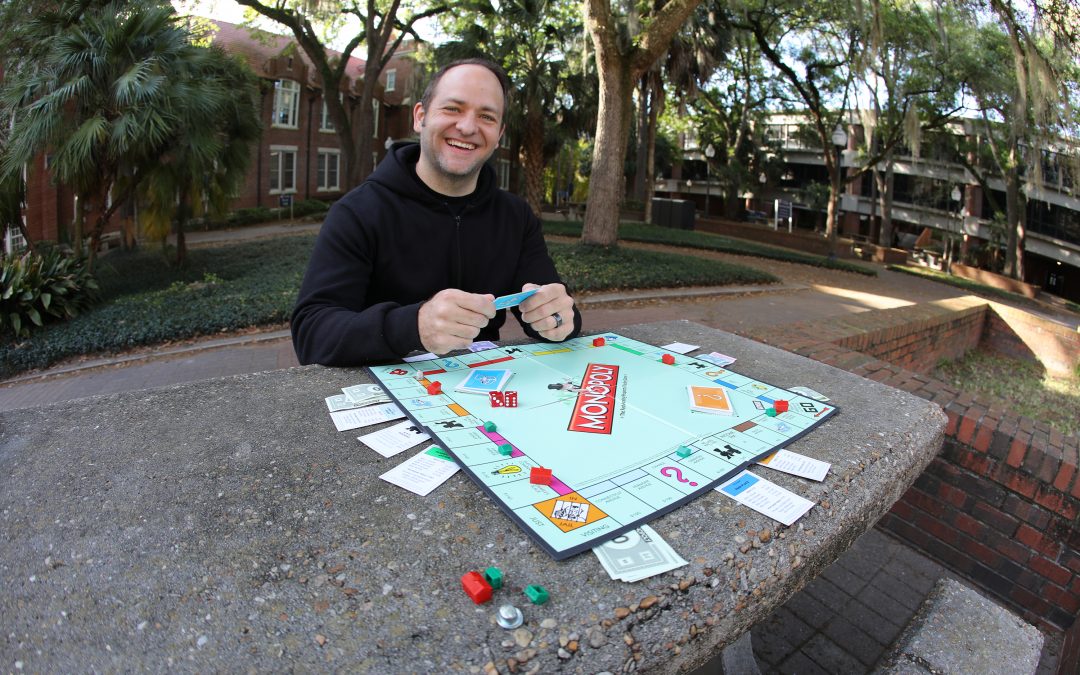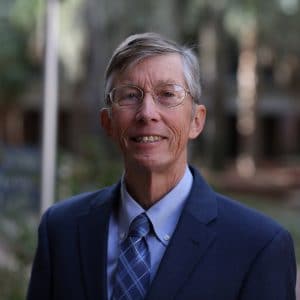Accounting isn’t a game, but learning it can be
Cheers and groans echo through Gerson Hall. Following the noise, passersby may be surprised to discover a classroom of graduate students playing boardgames. The competitors aren’t turning Gerson into a recreation center, though – class is in session.
Deloitte Foundation Term Associate Professor Paul Madsen takes this atypical approach in his introductory financial accounting course (ACG5005). Since joining the University of Florida Warrington College of Business in 2010, he’s been dedicated to teaching financial accounting to graduate students in a way that actually sticks. And the best way to do that, he’s found, is through Monopoly.
“A typical introductory accounting class requires students to do problem sets from a textbook,” Madsen explained. “This is a bad approach, in my opinion, because it deemphasizes the thing that matters most, which is the reason why a business might choose to engage in this type of transaction.”
Context is an integral part of understanding accounting systems – and what better way to learn how a system works than through hands-on experience? Madsen gives his students this opportunity by leading them through three games, or financial years, of Monopoly. Students are divided into teams of three and compete against each other, supporting their “company” through complementary roles.
“One of the reasons I have a bachelor’s degree and master’s degree in finance rather than accounting is because I took an introductory financial accounting class as an undergraduate and I hated it – none of it made sense!” he said. “It seemed to me like financial accounting was just a list of arbitrary rules that accountants memorize and then mechanically apply. That’s not very intellectually stimulating, and I avoided accounting for years after I took that class.
“I know now that I misunderstood financial accounting. I think I had a bad teacher and he poisoned my mind. I later learned that, despite its reputation, financial accounting has a beautiful structure and it got that structure through a long process of evolution. The history is amazing!”
Madsen earned his education in finance at the University of Utah. When he graduated into a recession in 2001, he struggled to find a good job and ended up working as an accountant for a small company where boredom inspired him to pursue a graduate degree. During that program, a class with Christine Botosan drove him to take his education even further, and he switched tracks to earn his doctorate in accounting from Emory University.
After completing his education, Madsen received job offers from UF and Carnegie Mellon University. Ultimately, he chose UF because he appreciated the positive research culture and realized Gainesville would be a better place to settle his family. Madsen has received multiple teaching and research awards at UF and been noted especially for his unusual research focus.
“My research is different because I focus on the accounting profession as the unit of analysis,” he expounded. “I am interested in evaluating claims about purported problems with the accounting profession which are supported by limited empirical evidence, often only anecdotes, but are used to justify proposals for potentially costly reforms. Examples of such claims are that there is [a] ‘standards overload’ in accounting, the quality of accounting is in decline and the accounting profession lacks diversity.
“My distinctive contribution has been to use sociological theories and an array of publicly available databases that have not previously appeared in the accounting literature to evaluate such claims.”
Evaluating the accounting profession as a whole makes Madsen’s work stand out. Because of his unique approach, he often authors his projects alone, and his work has been lauded as particularly innovative.
Madsen thinks he has the world’s best job, but in 2015 he suffered a personal tragedy that made him worry he would lose it. When a loved one passed away under heartbreaking circumstances, the loss impacted his productivity and he worried he wouldn’t recover. Two years later, though, he was relieved to discover that recovery was possible. Since then, emotional wellbeing has become important not only in his own routines, but also in the way he seeks to care for his students.
“I think I teach lessons about accounting through my lectures and assignments, but I also express elements of my philosophy of life through the way I treat students and manage my class,” he shared. “For example, I’m very sensitive to the psychological suffering of my students. I want to protect them against suffering over the demands of my class as much as I can and, when other elements of their life are causing them suffering, I want to do whatever I can to help them manage and endure it.
“This is an expression of my own life philosophy, part of which is an appreciation for the power of psychological wellbeing and also its fragility. This wasn’t always important to me, but life taught me about it.”
Empathizing with students is the most gratifying thing Madsen experiences as a professor, he says. Seeing them benefit from his teaching is also meaningful, though he often doesn’t get to see how his classes impacted them until years later, once the students have graduated and found good jobs. The same is true in his research. Knowing that his work won’t yield immediate results makes it challenging for Madsen to put in the work today, but he presses on and has been pleased to harvest good results from his intellectual investments.
Although most of Madsen’s work doesn’t have an immediate payoff, a lively class session around the Monopoly boards is always heartening. With over 50 students in the classroom, games are loud and fun. Animated negotiations tumble after the roll of the dice, and teams will exclaim over a particularly good or bad play. Past team names have included: Shiny Shoes, Vertex Investments, Oreo Castles and The Winners.
Outside of work, Madsen spends lots of time with his family of nine and in the gym. During the pandemic, he also picked up a new hobby: playing the guitar.
“Guitars have become an obsession for me,” he said. “Repairing them, playing them, learning their history. I am not very skilled, but being a bad guitar player and bad luthier are my favorite hobbies.”




